Portfolio Project: 6HC514 Educating in Health and Social Care Module
VerifiedAdded on 2023/01/13
|10
|3796
|82
Portfolio
AI Summary
This portfolio project, completed for the Educating in Health and Social Care module (6HC514), details the experiences and insights of a Band 7 review nurse manager. Activity A focuses on the induction process for new learners in the placement area, including the identification of learning opportunities. Activity B critically analyzes the planning and facilitation of learning for both Band 6 nurses and nursing students, integrating relevant learning theories. Activity C examines the role of the educator in assessment, detailing assessment strategies and how to support struggling learners. The project emphasizes the importance of clinical facilitation, setting learning objectives, choosing learning styles, tracking progress, and effective communication to enhance the learning experience. The project also highlights the contextual environment, use of comparison, and facilitation of critical thinking to promote active learning in healthcare education.
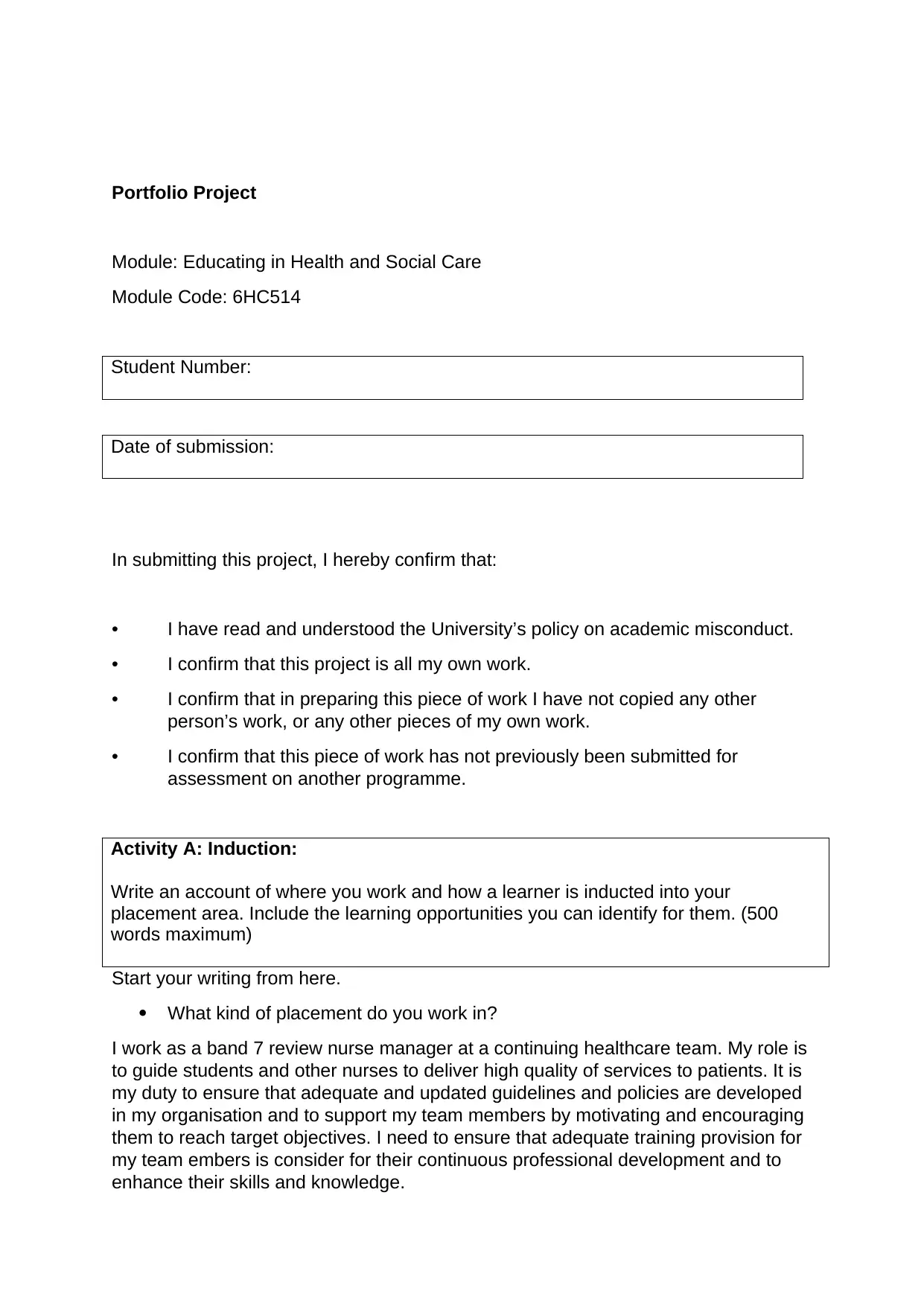
Portfolio Project
Module: Educating in Health and Social Care
Module Code: 6HC514
Student Number:
Date of submission:
In submitting this project, I hereby confirm that:
• I have read and understood the University’s policy on academic misconduct.
• I confirm that this project is all my own work.
• I confirm that in preparing this piece of work I have not copied any other
person’s work, or any other pieces of my own work.
• I confirm that this piece of work has not previously been submitted for
assessment on another programme.
Activity A: Induction:
Write an account of where you work and how a learner is inducted into your
placement area. Include the learning opportunities you can identify for them. (500
words maximum)
Start your writing from here.
What kind of placement do you work in?
I work as a band 7 review nurse manager at a continuing healthcare team. My role is
to guide students and other nurses to deliver high quality of services to patients. It is
my duty to ensure that adequate and updated guidelines and policies are developed
in my organisation and to support my team members by motivating and encouraging
them to reach target objectives. I need to ensure that adequate training provision for
my team embers is consider for their continuous professional development and to
enhance their skills and knowledge.
Module: Educating in Health and Social Care
Module Code: 6HC514
Student Number:
Date of submission:
In submitting this project, I hereby confirm that:
• I have read and understood the University’s policy on academic misconduct.
• I confirm that this project is all my own work.
• I confirm that in preparing this piece of work I have not copied any other
person’s work, or any other pieces of my own work.
• I confirm that this piece of work has not previously been submitted for
assessment on another programme.
Activity A: Induction:
Write an account of where you work and how a learner is inducted into your
placement area. Include the learning opportunities you can identify for them. (500
words maximum)
Start your writing from here.
What kind of placement do you work in?
I work as a band 7 review nurse manager at a continuing healthcare team. My role is
to guide students and other nurses to deliver high quality of services to patients. It is
my duty to ensure that adequate and updated guidelines and policies are developed
in my organisation and to support my team members by motivating and encouraging
them to reach target objectives. I need to ensure that adequate training provision for
my team embers is consider for their continuous professional development and to
enhance their skills and knowledge.
Paraphrase This Document
Need a fresh take? Get an instant paraphrase of this document with our AI Paraphraser
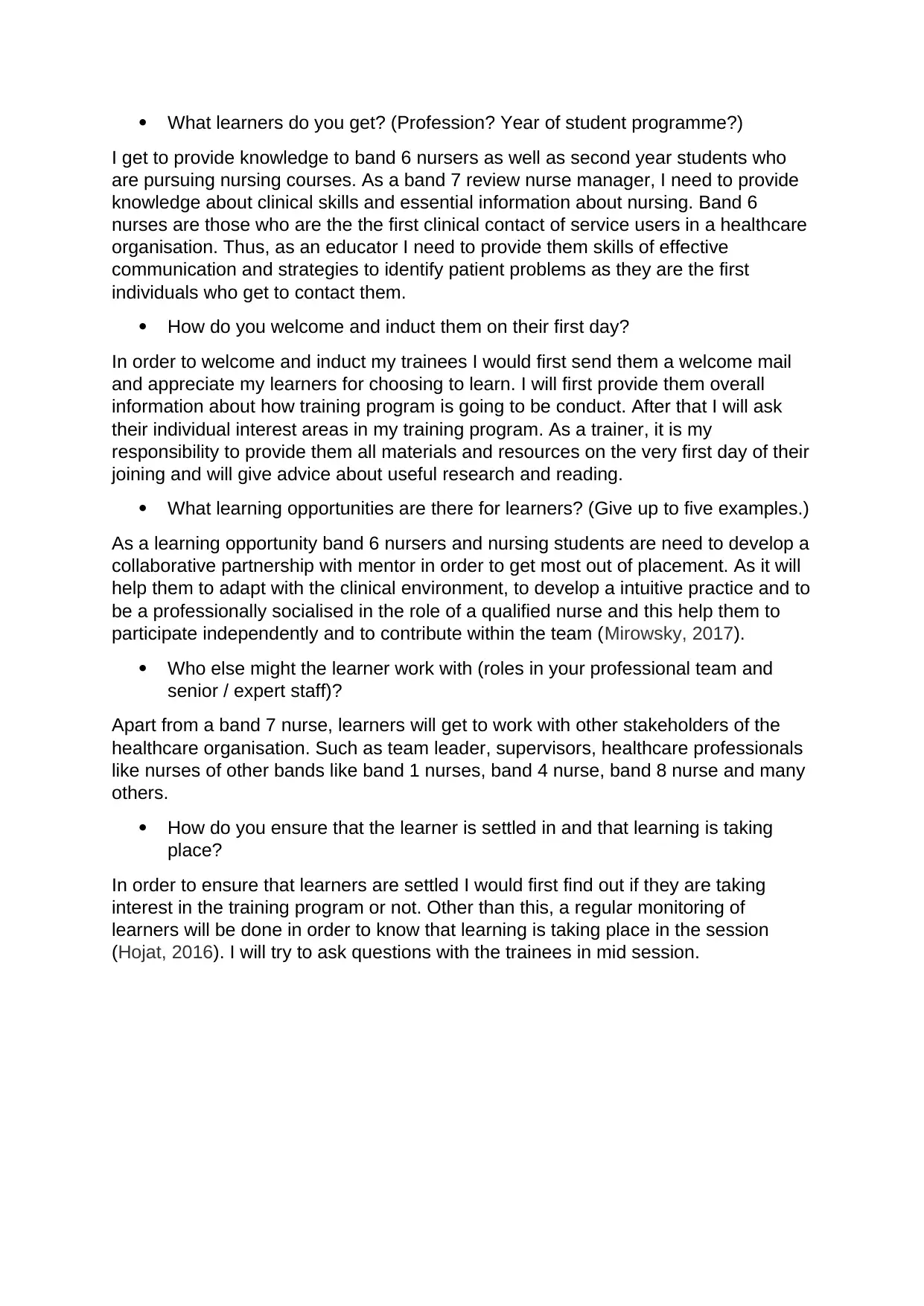
What learners do you get? (Profession? Year of student programme?)
I get to provide knowledge to band 6 nursers as well as second year students who
are pursuing nursing courses. As a band 7 review nurse manager, I need to provide
knowledge about clinical skills and essential information about nursing. Band 6
nurses are those who are the the first clinical contact of service users in a healthcare
organisation. Thus, as an educator I need to provide them skills of effective
communication and strategies to identify patient problems as they are the first
individuals who get to contact them.
How do you welcome and induct them on their first day?
In order to welcome and induct my trainees I would first send them a welcome mail
and appreciate my learners for choosing to learn. I will first provide them overall
information about how training program is going to be conduct. After that I will ask
their individual interest areas in my training program. As a trainer, it is my
responsibility to provide them all materials and resources on the very first day of their
joining and will give advice about useful research and reading.
What learning opportunities are there for learners? (Give up to five examples.)
As a learning opportunity band 6 nursers and nursing students are need to develop a
collaborative partnership with mentor in order to get most out of placement. As it will
help them to adapt with the clinical environment, to develop a intuitive practice and to
be a professionally socialised in the role of a qualified nurse and this help them to
participate independently and to contribute within the team (Mirowsky, 2017).
Who else might the learner work with (roles in your professional team and
senior / expert staff)?
Apart from a band 7 nurse, learners will get to work with other stakeholders of the
healthcare organisation. Such as team leader, supervisors, healthcare professionals
like nurses of other bands like band 1 nurses, band 4 nurse, band 8 nurse and many
others.
How do you ensure that the learner is settled in and that learning is taking
place?
In order to ensure that learners are settled I would first find out if they are taking
interest in the training program or not. Other than this, a regular monitoring of
learners will be done in order to know that learning is taking place in the session
(Hojat, 2016). I will try to ask questions with the trainees in mid session.
I get to provide knowledge to band 6 nursers as well as second year students who
are pursuing nursing courses. As a band 7 review nurse manager, I need to provide
knowledge about clinical skills and essential information about nursing. Band 6
nurses are those who are the the first clinical contact of service users in a healthcare
organisation. Thus, as an educator I need to provide them skills of effective
communication and strategies to identify patient problems as they are the first
individuals who get to contact them.
How do you welcome and induct them on their first day?
In order to welcome and induct my trainees I would first send them a welcome mail
and appreciate my learners for choosing to learn. I will first provide them overall
information about how training program is going to be conduct. After that I will ask
their individual interest areas in my training program. As a trainer, it is my
responsibility to provide them all materials and resources on the very first day of their
joining and will give advice about useful research and reading.
What learning opportunities are there for learners? (Give up to five examples.)
As a learning opportunity band 6 nursers and nursing students are need to develop a
collaborative partnership with mentor in order to get most out of placement. As it will
help them to adapt with the clinical environment, to develop a intuitive practice and to
be a professionally socialised in the role of a qualified nurse and this help them to
participate independently and to contribute within the team (Mirowsky, 2017).
Who else might the learner work with (roles in your professional team and
senior / expert staff)?
Apart from a band 7 nurse, learners will get to work with other stakeholders of the
healthcare organisation. Such as team leader, supervisors, healthcare professionals
like nurses of other bands like band 1 nurses, band 4 nurse, band 8 nurse and many
others.
How do you ensure that the learner is settled in and that learning is taking
place?
In order to ensure that learners are settled I would first find out if they are taking
interest in the training program or not. Other than this, a regular monitoring of
learners will be done in order to know that learning is taking place in the session
(Hojat, 2016). I will try to ask questions with the trainees in mid session.
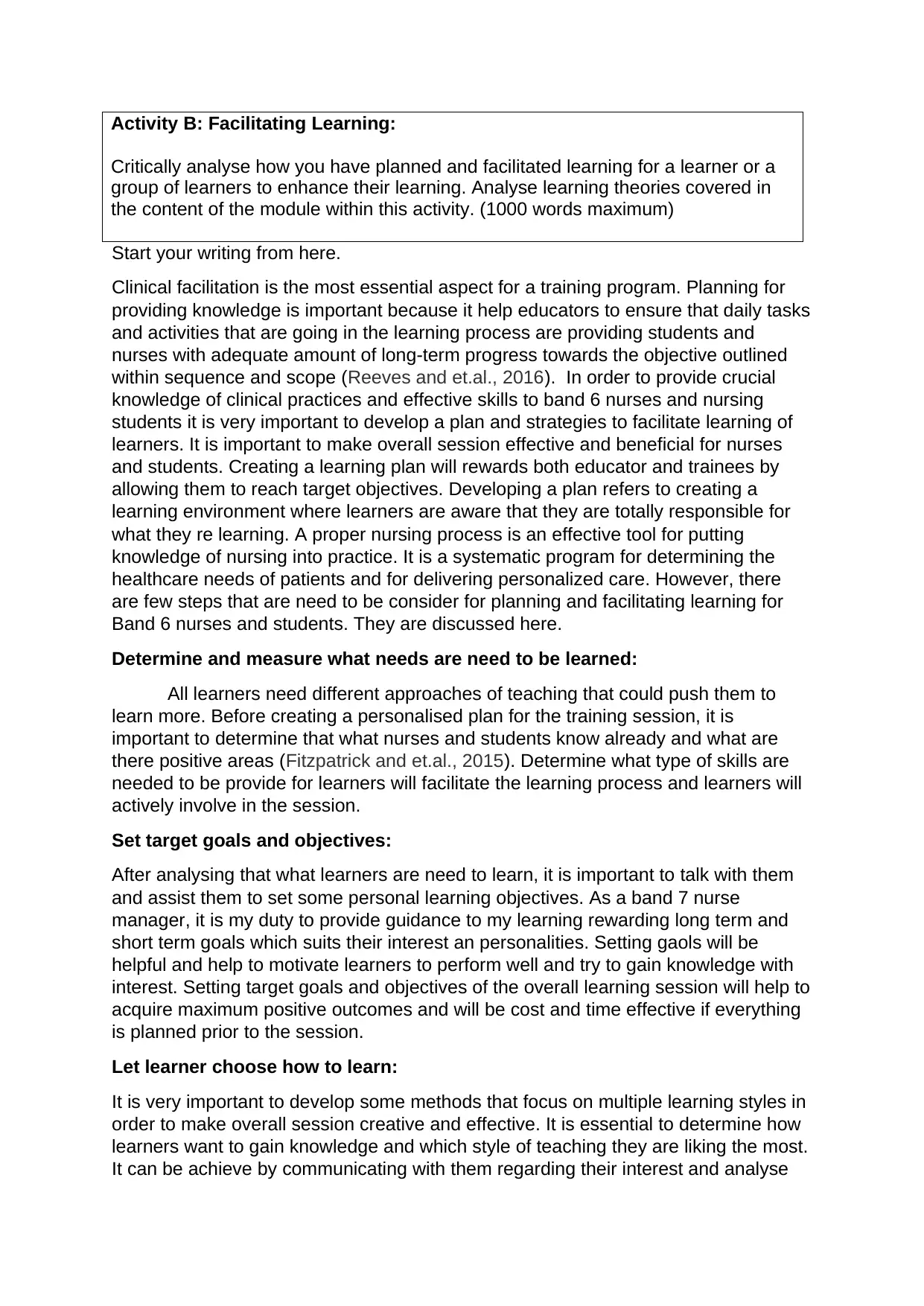
Activity B: Facilitating Learning:
Critically analyse how you have planned and facilitated learning for a learner or a
group of learners to enhance their learning. Analyse learning theories covered in
the content of the module within this activity. (1000 words maximum)
Start your writing from here.
Clinical facilitation is the most essential aspect for a training program. Planning for
providing knowledge is important because it help educators to ensure that daily tasks
and activities that are going in the learning process are providing students and
nurses with adequate amount of long-term progress towards the objective outlined
within sequence and scope (Reeves and et.al., 2016). In order to provide crucial
knowledge of clinical practices and effective skills to band 6 nurses and nursing
students it is very important to develop a plan and strategies to facilitate learning of
learners. It is important to make overall session effective and beneficial for nurses
and students. Creating a learning plan will rewards both educator and trainees by
allowing them to reach target objectives. Developing a plan refers to creating a
learning environment where learners are aware that they are totally responsible for
what they re learning. A proper nursing process is an effective tool for putting
knowledge of nursing into practice. It is a systematic program for determining the
healthcare needs of patients and for delivering personalized care. However, there
are few steps that are need to be consider for planning and facilitating learning for
Band 6 nurses and students. They are discussed here.
Determine and measure what needs are need to be learned:
All learners need different approaches of teaching that could push them to
learn more. Before creating a personalised plan for the training session, it is
important to determine that what nurses and students know already and what are
there positive areas (Fitzpatrick and et.al., 2015). Determine what type of skills are
needed to be provide for learners will facilitate the learning process and learners will
actively involve in the session.
Set target goals and objectives:
After analysing that what learners are need to learn, it is important to talk with them
and assist them to set some personal learning objectives. As a band 7 nurse
manager, it is my duty to provide guidance to my learning rewarding long term and
short term goals which suits their interest an personalities. Setting gaols will be
helpful and help to motivate learners to perform well and try to gain knowledge with
interest. Setting target goals and objectives of the overall learning session will help to
acquire maximum positive outcomes and will be cost and time effective if everything
is planned prior to the session.
Let learner choose how to learn:
It is very important to develop some methods that focus on multiple learning styles in
order to make overall session creative and effective. It is essential to determine how
learners want to gain knowledge and which style of teaching they are liking the most.
It can be achieve by communicating with them regarding their interest and analyse
Critically analyse how you have planned and facilitated learning for a learner or a
group of learners to enhance their learning. Analyse learning theories covered in
the content of the module within this activity. (1000 words maximum)
Start your writing from here.
Clinical facilitation is the most essential aspect for a training program. Planning for
providing knowledge is important because it help educators to ensure that daily tasks
and activities that are going in the learning process are providing students and
nurses with adequate amount of long-term progress towards the objective outlined
within sequence and scope (Reeves and et.al., 2016). In order to provide crucial
knowledge of clinical practices and effective skills to band 6 nurses and nursing
students it is very important to develop a plan and strategies to facilitate learning of
learners. It is important to make overall session effective and beneficial for nurses
and students. Creating a learning plan will rewards both educator and trainees by
allowing them to reach target objectives. Developing a plan refers to creating a
learning environment where learners are aware that they are totally responsible for
what they re learning. A proper nursing process is an effective tool for putting
knowledge of nursing into practice. It is a systematic program for determining the
healthcare needs of patients and for delivering personalized care. However, there
are few steps that are need to be consider for planning and facilitating learning for
Band 6 nurses and students. They are discussed here.
Determine and measure what needs are need to be learned:
All learners need different approaches of teaching that could push them to
learn more. Before creating a personalised plan for the training session, it is
important to determine that what nurses and students know already and what are
there positive areas (Fitzpatrick and et.al., 2015). Determine what type of skills are
needed to be provide for learners will facilitate the learning process and learners will
actively involve in the session.
Set target goals and objectives:
After analysing that what learners are need to learn, it is important to talk with them
and assist them to set some personal learning objectives. As a band 7 nurse
manager, it is my duty to provide guidance to my learning rewarding long term and
short term goals which suits their interest an personalities. Setting gaols will be
helpful and help to motivate learners to perform well and try to gain knowledge with
interest. Setting target goals and objectives of the overall learning session will help to
acquire maximum positive outcomes and will be cost and time effective if everything
is planned prior to the session.
Let learner choose how to learn:
It is very important to develop some methods that focus on multiple learning styles in
order to make overall session creative and effective. It is essential to determine how
learners want to gain knowledge and which style of teaching they are liking the most.
It can be achieve by communicating with them regarding their interest and analyse
⊘ This is a preview!⊘
Do you want full access?
Subscribe today to unlock all pages.

Trusted by 1+ million students worldwide
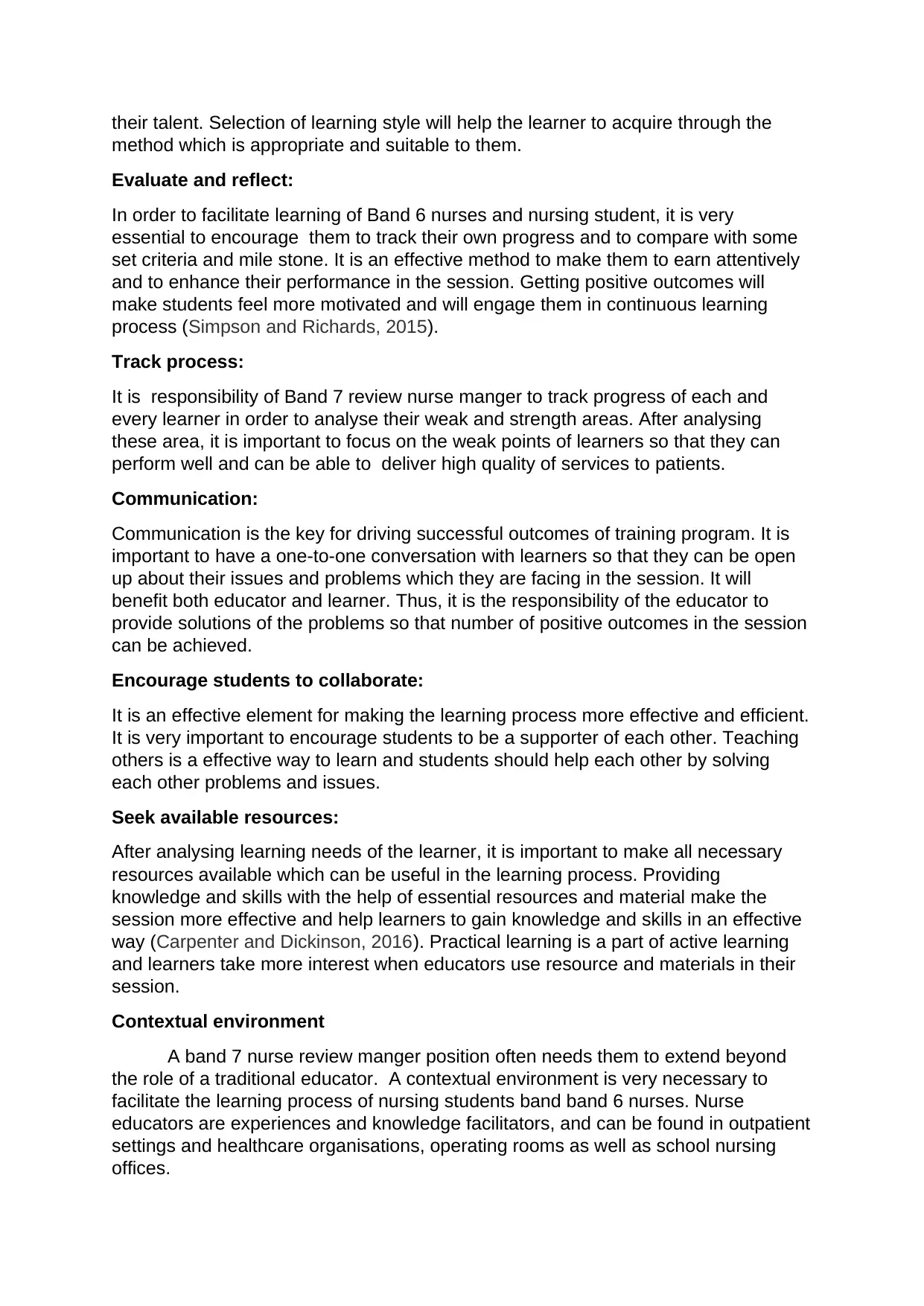
their talent. Selection of learning style will help the learner to acquire through the
method which is appropriate and suitable to them.
Evaluate and reflect:
In order to facilitate learning of Band 6 nurses and nursing student, it is very
essential to encourage them to track their own progress and to compare with some
set criteria and mile stone. It is an effective method to make them to earn attentively
and to enhance their performance in the session. Getting positive outcomes will
make students feel more motivated and will engage them in continuous learning
process (Simpson and Richards, 2015).
Track process:
It is responsibility of Band 7 review nurse manger to track progress of each and
every learner in order to analyse their weak and strength areas. After analysing
these area, it is important to focus on the weak points of learners so that they can
perform well and can be able to deliver high quality of services to patients.
Communication:
Communication is the key for driving successful outcomes of training program. It is
important to have a one-to-one conversation with learners so that they can be open
up about their issues and problems which they are facing in the session. It will
benefit both educator and learner. Thus, it is the responsibility of the educator to
provide solutions of the problems so that number of positive outcomes in the session
can be achieved.
Encourage students to collaborate:
It is an effective element for making the learning process more effective and efficient.
It is very important to encourage students to be a supporter of each other. Teaching
others is a effective way to learn and students should help each other by solving
each other problems and issues.
Seek available resources:
After analysing learning needs of the learner, it is important to make all necessary
resources available which can be useful in the learning process. Providing
knowledge and skills with the help of essential resources and material make the
session more effective and help learners to gain knowledge and skills in an effective
way (Carpenter and Dickinson, 2016). Practical learning is a part of active learning
and learners take more interest when educators use resource and materials in their
session.
Contextual environment
A band 7 nurse review manger position often needs them to extend beyond
the role of a traditional educator. A contextual environment is very necessary to
facilitate the learning process of nursing students band band 6 nurses. Nurse
educators are experiences and knowledge facilitators, and can be found in outpatient
settings and healthcare organisations, operating rooms as well as school nursing
offices.
method which is appropriate and suitable to them.
Evaluate and reflect:
In order to facilitate learning of Band 6 nurses and nursing student, it is very
essential to encourage them to track their own progress and to compare with some
set criteria and mile stone. It is an effective method to make them to earn attentively
and to enhance their performance in the session. Getting positive outcomes will
make students feel more motivated and will engage them in continuous learning
process (Simpson and Richards, 2015).
Track process:
It is responsibility of Band 7 review nurse manger to track progress of each and
every learner in order to analyse their weak and strength areas. After analysing
these area, it is important to focus on the weak points of learners so that they can
perform well and can be able to deliver high quality of services to patients.
Communication:
Communication is the key for driving successful outcomes of training program. It is
important to have a one-to-one conversation with learners so that they can be open
up about their issues and problems which they are facing in the session. It will
benefit both educator and learner. Thus, it is the responsibility of the educator to
provide solutions of the problems so that number of positive outcomes in the session
can be achieved.
Encourage students to collaborate:
It is an effective element for making the learning process more effective and efficient.
It is very important to encourage students to be a supporter of each other. Teaching
others is a effective way to learn and students should help each other by solving
each other problems and issues.
Seek available resources:
After analysing learning needs of the learner, it is important to make all necessary
resources available which can be useful in the learning process. Providing
knowledge and skills with the help of essential resources and material make the
session more effective and help learners to gain knowledge and skills in an effective
way (Carpenter and Dickinson, 2016). Practical learning is a part of active learning
and learners take more interest when educators use resource and materials in their
session.
Contextual environment
A band 7 nurse review manger position often needs them to extend beyond
the role of a traditional educator. A contextual environment is very necessary to
facilitate the learning process of nursing students band band 6 nurses. Nurse
educators are experiences and knowledge facilitators, and can be found in outpatient
settings and healthcare organisations, operating rooms as well as school nursing
offices.
Paraphrase This Document
Need a fresh take? Get an instant paraphrase of this document with our AI Paraphraser
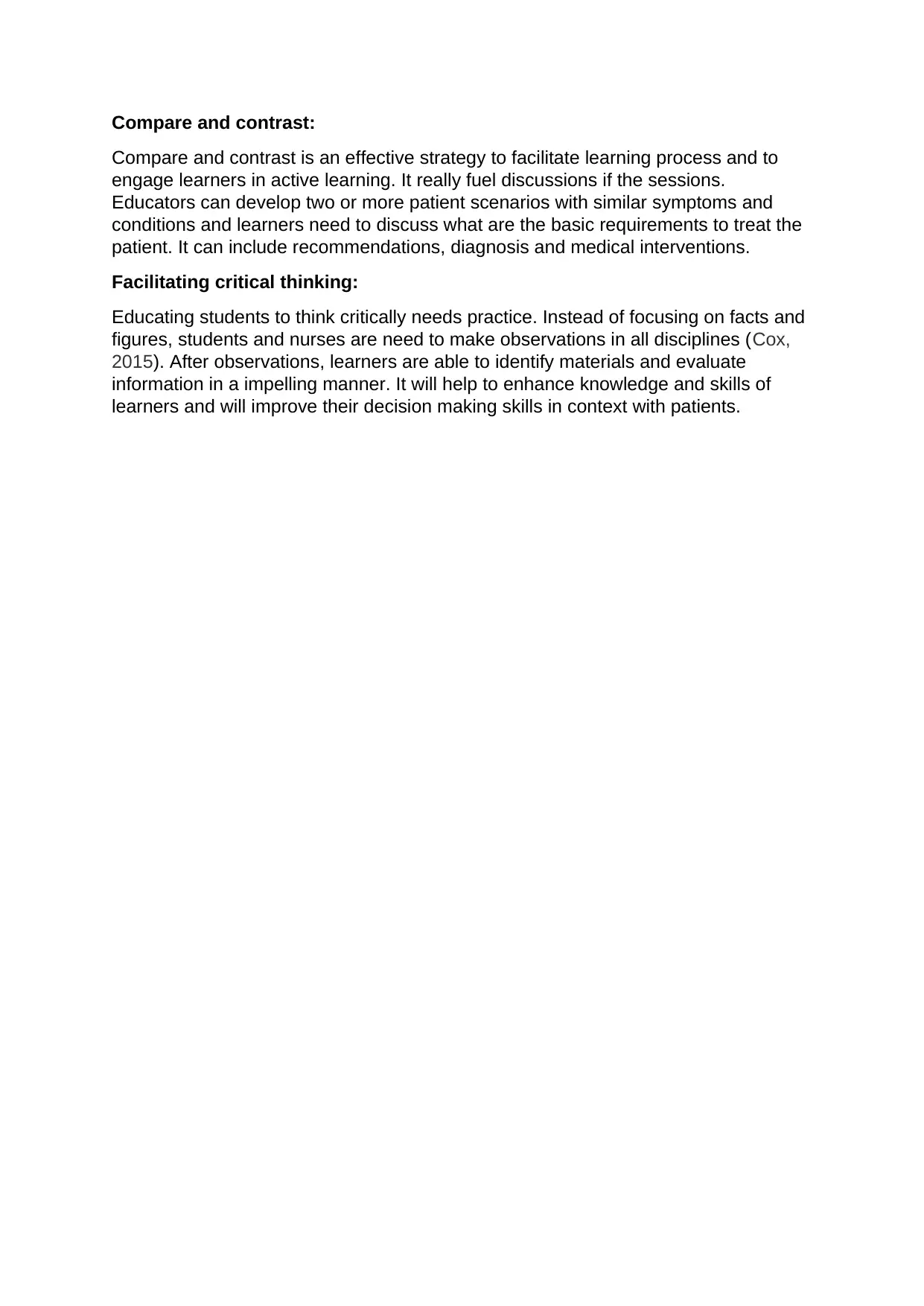
Compare and contrast:
Compare and contrast is an effective strategy to facilitate learning process and to
engage learners in active learning. It really fuel discussions if the sessions.
Educators can develop two or more patient scenarios with similar symptoms and
conditions and learners need to discuss what are the basic requirements to treat the
patient. It can include recommendations, diagnosis and medical interventions.
Facilitating critical thinking:
Educating students to think critically needs practice. Instead of focusing on facts and
figures, students and nurses are need to make observations in all disciplines (Cox,
2015). After observations, learners are able to identify materials and evaluate
information in a impelling manner. It will help to enhance knowledge and skills of
learners and will improve their decision making skills in context with patients.
Compare and contrast is an effective strategy to facilitate learning process and to
engage learners in active learning. It really fuel discussions if the sessions.
Educators can develop two or more patient scenarios with similar symptoms and
conditions and learners need to discuss what are the basic requirements to treat the
patient. It can include recommendations, diagnosis and medical interventions.
Facilitating critical thinking:
Educating students to think critically needs practice. Instead of focusing on facts and
figures, students and nurses are need to make observations in all disciplines (Cox,
2015). After observations, learners are able to identify materials and evaluate
information in a impelling manner. It will help to enhance knowledge and skills of
learners and will improve their decision making skills in context with patients.
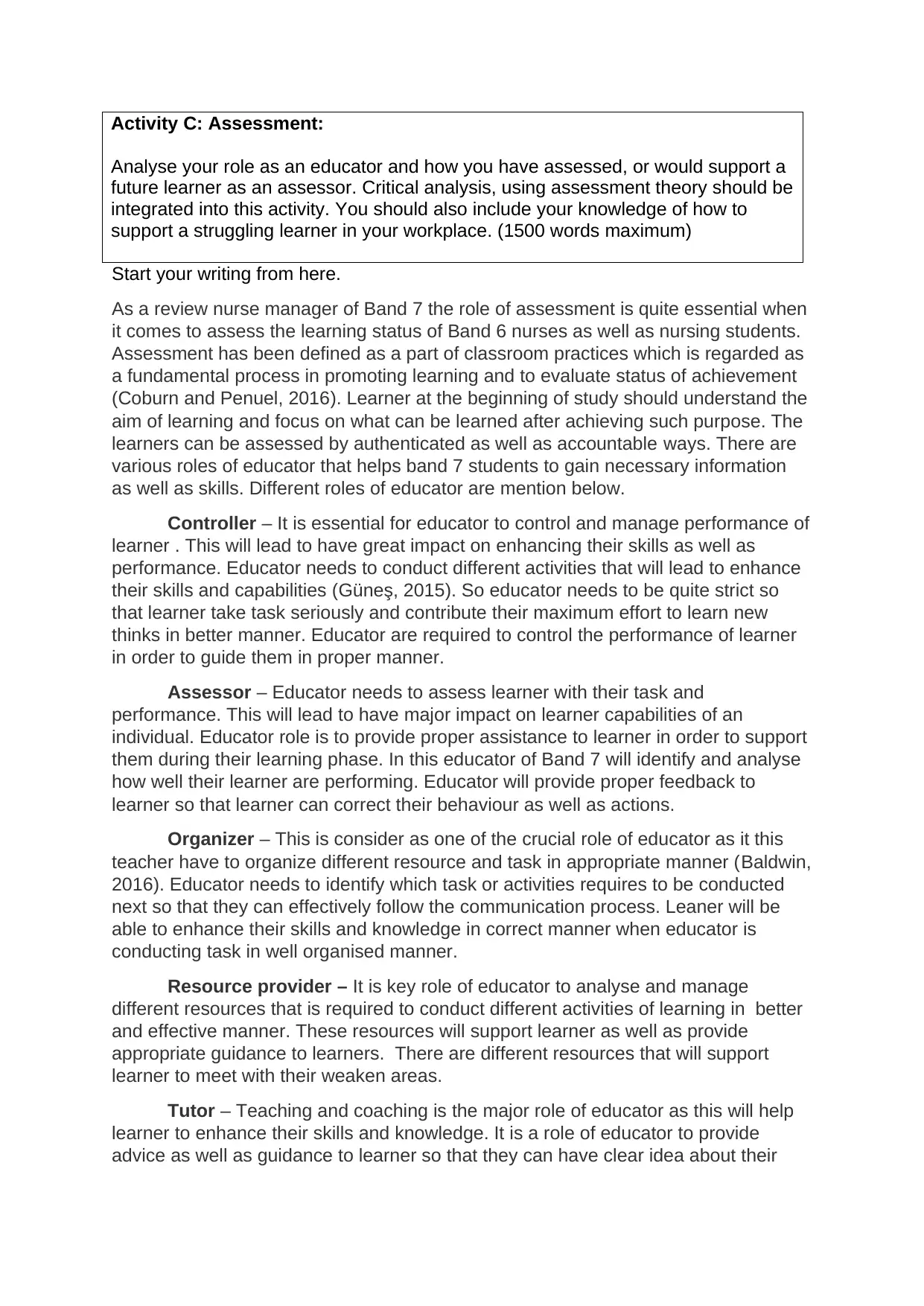
Activity C: Assessment:
Analyse your role as an educator and how you have assessed, or would support a
future learner as an assessor. Critical analysis, using assessment theory should be
integrated into this activity. You should also include your knowledge of how to
support a struggling learner in your workplace. (1500 words maximum)
Start your writing from here.
As a review nurse manager of Band 7 the role of assessment is quite essential when
it comes to assess the learning status of Band 6 nurses as well as nursing students.
Assessment has been defined as a part of classroom practices which is regarded as
a fundamental process in promoting learning and to evaluate status of achievement
(Coburn and Penuel, 2016). Learner at the beginning of study should understand the
aim of learning and focus on what can be learned after achieving such purpose. The
learners can be assessed by authenticated as well as accountable ways. There are
various roles of educator that helps band 7 students to gain necessary information
as well as skills. Different roles of educator are mention below.
Controller – It is essential for educator to control and manage performance of
learner . This will lead to have great impact on enhancing their skills as well as
performance. Educator needs to conduct different activities that will lead to enhance
their skills and capabilities (Güneş, 2015). So educator needs to be quite strict so
that learner take task seriously and contribute their maximum effort to learn new
thinks in better manner. Educator are required to control the performance of learner
in order to guide them in proper manner.
Assessor – Educator needs to assess learner with their task and
performance. This will lead to have major impact on learner capabilities of an
individual. Educator role is to provide proper assistance to learner in order to support
them during their learning phase. In this educator of Band 7 will identify and analyse
how well their learner are performing. Educator will provide proper feedback to
learner so that learner can correct their behaviour as well as actions.
Organizer – This is consider as one of the crucial role of educator as it this
teacher have to organize different resource and task in appropriate manner (Baldwin,
2016). Educator needs to identify which task or activities requires to be conducted
next so that they can effectively follow the communication process. Leaner will be
able to enhance their skills and knowledge in correct manner when educator is
conducting task in well organised manner.
Resource provider – It is key role of educator to analyse and manage
different resources that is required to conduct different activities of learning in better
and effective manner. These resources will support learner as well as provide
appropriate guidance to learners. There are different resources that will support
learner to meet with their weaken areas.
Tutor – Teaching and coaching is the major role of educator as this will help
learner to enhance their skills and knowledge. It is a role of educator to provide
advice as well as guidance to learner so that they can have clear idea about their
Analyse your role as an educator and how you have assessed, or would support a
future learner as an assessor. Critical analysis, using assessment theory should be
integrated into this activity. You should also include your knowledge of how to
support a struggling learner in your workplace. (1500 words maximum)
Start your writing from here.
As a review nurse manager of Band 7 the role of assessment is quite essential when
it comes to assess the learning status of Band 6 nurses as well as nursing students.
Assessment has been defined as a part of classroom practices which is regarded as
a fundamental process in promoting learning and to evaluate status of achievement
(Coburn and Penuel, 2016). Learner at the beginning of study should understand the
aim of learning and focus on what can be learned after achieving such purpose. The
learners can be assessed by authenticated as well as accountable ways. There are
various roles of educator that helps band 7 students to gain necessary information
as well as skills. Different roles of educator are mention below.
Controller – It is essential for educator to control and manage performance of
learner . This will lead to have great impact on enhancing their skills as well as
performance. Educator needs to conduct different activities that will lead to enhance
their skills and capabilities (Güneş, 2015). So educator needs to be quite strict so
that learner take task seriously and contribute their maximum effort to learn new
thinks in better manner. Educator are required to control the performance of learner
in order to guide them in proper manner.
Assessor – Educator needs to assess learner with their task and
performance. This will lead to have major impact on learner capabilities of an
individual. Educator role is to provide proper assistance to learner in order to support
them during their learning phase. In this educator of Band 7 will identify and analyse
how well their learner are performing. Educator will provide proper feedback to
learner so that learner can correct their behaviour as well as actions.
Organizer – This is consider as one of the crucial role of educator as it this
teacher have to organize different resource and task in appropriate manner (Baldwin,
2016). Educator needs to identify which task or activities requires to be conducted
next so that they can effectively follow the communication process. Leaner will be
able to enhance their skills and knowledge in correct manner when educator is
conducting task in well organised manner.
Resource provider – It is key role of educator to analyse and manage
different resources that is required to conduct different activities of learning in better
and effective manner. These resources will support learner as well as provide
appropriate guidance to learners. There are different resources that will support
learner to meet with their weaken areas.
Tutor – Teaching and coaching is the major role of educator as this will help
learner to enhance their skills and knowledge. It is a role of educator to provide
advice as well as guidance to learner so that they can have clear idea about their
⊘ This is a preview!⊘
Do you want full access?
Subscribe today to unlock all pages.

Trusted by 1+ million students worldwide
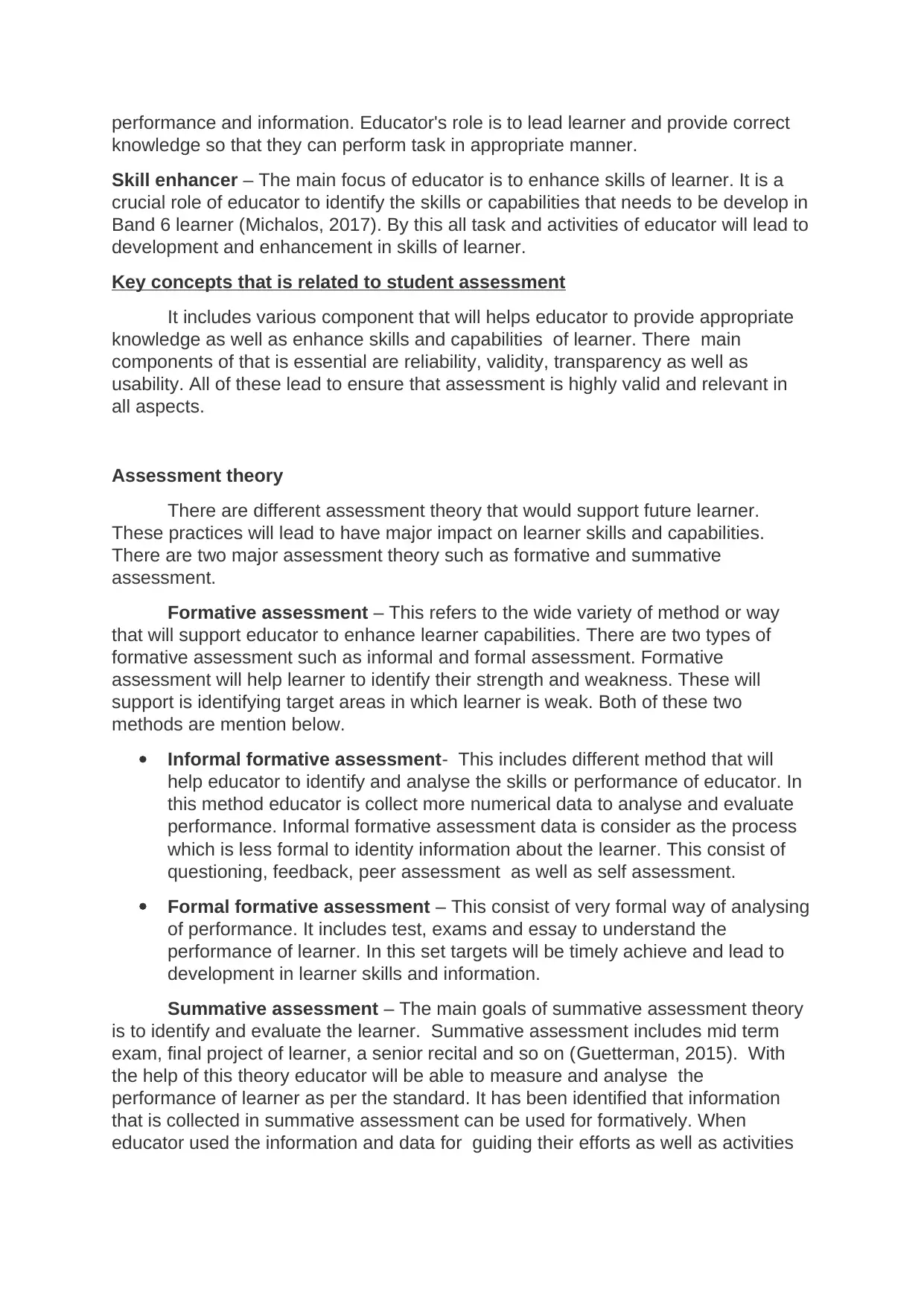
performance and information. Educator's role is to lead learner and provide correct
knowledge so that they can perform task in appropriate manner.
Skill enhancer – The main focus of educator is to enhance skills of learner. It is a
crucial role of educator to identify the skills or capabilities that needs to be develop in
Band 6 learner (Michalos, 2017). By this all task and activities of educator will lead to
development and enhancement in skills of learner.
Key concepts that is related to student assessment
It includes various component that will helps educator to provide appropriate
knowledge as well as enhance skills and capabilities of learner. There main
components of that is essential are reliability, validity, transparency as well as
usability. All of these lead to ensure that assessment is highly valid and relevant in
all aspects.
Assessment theory
There are different assessment theory that would support future learner.
These practices will lead to have major impact on learner skills and capabilities.
There are two major assessment theory such as formative and summative
assessment.
Formative assessment – This refers to the wide variety of method or way
that will support educator to enhance learner capabilities. There are two types of
formative assessment such as informal and formal assessment. Formative
assessment will help learner to identify their strength and weakness. These will
support is identifying target areas in which learner is weak. Both of these two
methods are mention below.
Informal formative assessment- This includes different method that will
help educator to identify and analyse the skills or performance of educator. In
this method educator is collect more numerical data to analyse and evaluate
performance. Informal formative assessment data is consider as the process
which is less formal to identity information about the learner. This consist of
questioning, feedback, peer assessment as well as self assessment.
Formal formative assessment – This consist of very formal way of analysing
of performance. It includes test, exams and essay to understand the
performance of learner. In this set targets will be timely achieve and lead to
development in learner skills and information.
Summative assessment – The main goals of summative assessment theory
is to identify and evaluate the learner. Summative assessment includes mid term
exam, final project of learner, a senior recital and so on (Guetterman, 2015). With
the help of this theory educator will be able to measure and analyse the
performance of learner as per the standard. It has been identified that information
that is collected in summative assessment can be used for formatively. When
educator used the information and data for guiding their efforts as well as activities
knowledge so that they can perform task in appropriate manner.
Skill enhancer – The main focus of educator is to enhance skills of learner. It is a
crucial role of educator to identify the skills or capabilities that needs to be develop in
Band 6 learner (Michalos, 2017). By this all task and activities of educator will lead to
development and enhancement in skills of learner.
Key concepts that is related to student assessment
It includes various component that will helps educator to provide appropriate
knowledge as well as enhance skills and capabilities of learner. There main
components of that is essential are reliability, validity, transparency as well as
usability. All of these lead to ensure that assessment is highly valid and relevant in
all aspects.
Assessment theory
There are different assessment theory that would support future learner.
These practices will lead to have major impact on learner skills and capabilities.
There are two major assessment theory such as formative and summative
assessment.
Formative assessment – This refers to the wide variety of method or way
that will support educator to enhance learner capabilities. There are two types of
formative assessment such as informal and formal assessment. Formative
assessment will help learner to identify their strength and weakness. These will
support is identifying target areas in which learner is weak. Both of these two
methods are mention below.
Informal formative assessment- This includes different method that will
help educator to identify and analyse the skills or performance of educator. In
this method educator is collect more numerical data to analyse and evaluate
performance. Informal formative assessment data is consider as the process
which is less formal to identity information about the learner. This consist of
questioning, feedback, peer assessment as well as self assessment.
Formal formative assessment – This consist of very formal way of analysing
of performance. It includes test, exams and essay to understand the
performance of learner. In this set targets will be timely achieve and lead to
development in learner skills and information.
Summative assessment – The main goals of summative assessment theory
is to identify and evaluate the learner. Summative assessment includes mid term
exam, final project of learner, a senior recital and so on (Guetterman, 2015). With
the help of this theory educator will be able to measure and analyse the
performance of learner as per the standard. It has been identified that information
that is collected in summative assessment can be used for formatively. When
educator used the information and data for guiding their efforts as well as activities
Paraphrase This Document
Need a fresh take? Get an instant paraphrase of this document with our AI Paraphraser
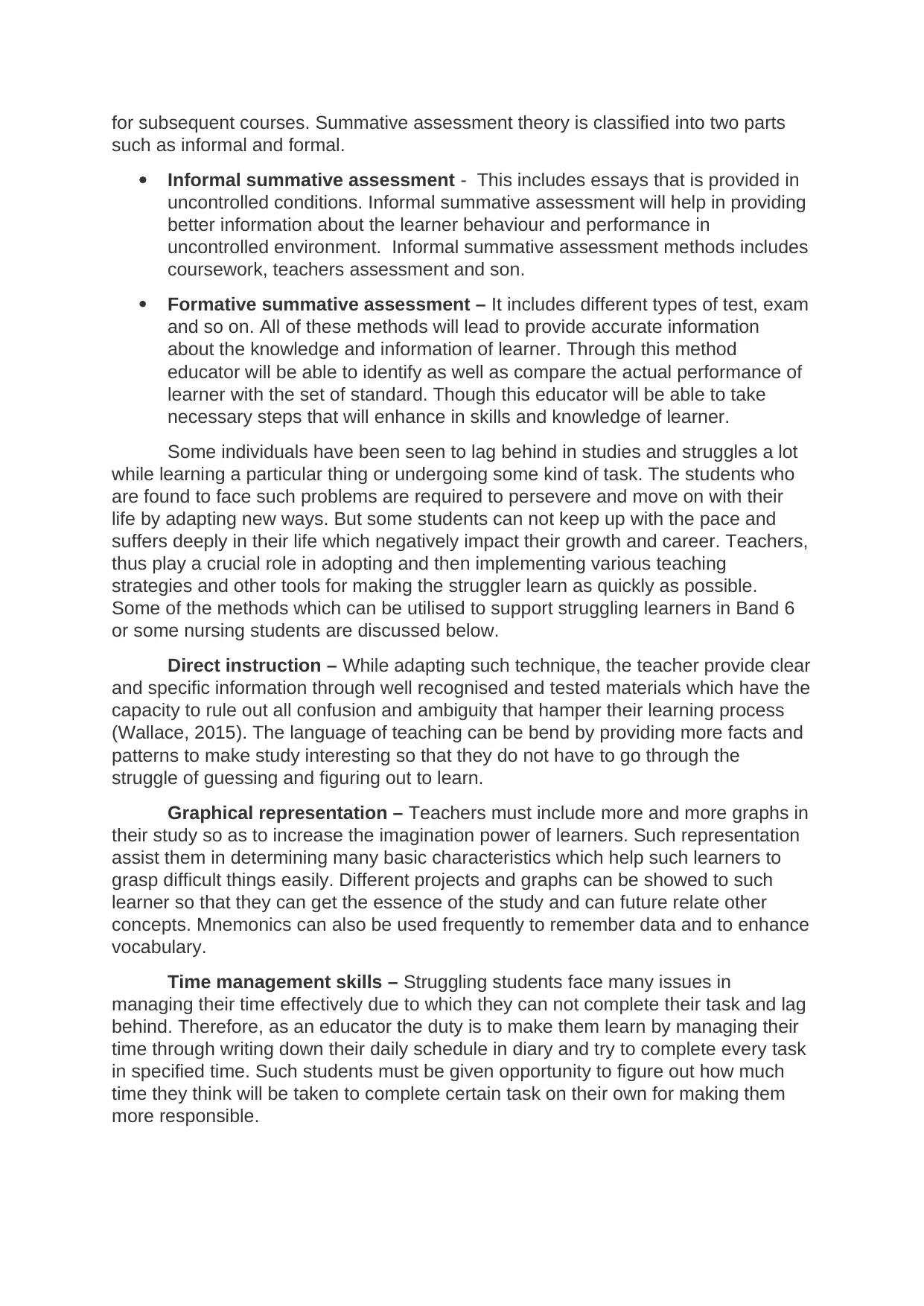
for subsequent courses. Summative assessment theory is classified into two parts
such as informal and formal.
Informal summative assessment - This includes essays that is provided in
uncontrolled conditions. Informal summative assessment will help in providing
better information about the learner behaviour and performance in
uncontrolled environment. Informal summative assessment methods includes
coursework, teachers assessment and son.
Formative summative assessment – It includes different types of test, exam
and so on. All of these methods will lead to provide accurate information
about the knowledge and information of learner. Through this method
educator will be able to identify as well as compare the actual performance of
learner with the set of standard. Though this educator will be able to take
necessary steps that will enhance in skills and knowledge of learner.
Some individuals have been seen to lag behind in studies and struggles a lot
while learning a particular thing or undergoing some kind of task. The students who
are found to face such problems are required to persevere and move on with their
life by adapting new ways. But some students can not keep up with the pace and
suffers deeply in their life which negatively impact their growth and career. Teachers,
thus play a crucial role in adopting and then implementing various teaching
strategies and other tools for making the struggler learn as quickly as possible.
Some of the methods which can be utilised to support struggling learners in Band 6
or some nursing students are discussed below.
Direct instruction – While adapting such technique, the teacher provide clear
and specific information through well recognised and tested materials which have the
capacity to rule out all confusion and ambiguity that hamper their learning process
(Wallace, 2015). The language of teaching can be bend by providing more facts and
patterns to make study interesting so that they do not have to go through the
struggle of guessing and figuring out to learn.
Graphical representation – Teachers must include more and more graphs in
their study so as to increase the imagination power of learners. Such representation
assist them in determining many basic characteristics which help such learners to
grasp difficult things easily. Different projects and graphs can be showed to such
learner so that they can get the essence of the study and can future relate other
concepts. Mnemonics can also be used frequently to remember data and to enhance
vocabulary.
Time management skills – Struggling students face many issues in
managing their time effectively due to which they can not complete their task and lag
behind. Therefore, as an educator the duty is to make them learn by managing their
time through writing down their daily schedule in diary and try to complete every task
in specified time. Such students must be given opportunity to figure out how much
time they think will be taken to complete certain task on their own for making them
more responsible.
such as informal and formal.
Informal summative assessment - This includes essays that is provided in
uncontrolled conditions. Informal summative assessment will help in providing
better information about the learner behaviour and performance in
uncontrolled environment. Informal summative assessment methods includes
coursework, teachers assessment and son.
Formative summative assessment – It includes different types of test, exam
and so on. All of these methods will lead to provide accurate information
about the knowledge and information of learner. Through this method
educator will be able to identify as well as compare the actual performance of
learner with the set of standard. Though this educator will be able to take
necessary steps that will enhance in skills and knowledge of learner.
Some individuals have been seen to lag behind in studies and struggles a lot
while learning a particular thing or undergoing some kind of task. The students who
are found to face such problems are required to persevere and move on with their
life by adapting new ways. But some students can not keep up with the pace and
suffers deeply in their life which negatively impact their growth and career. Teachers,
thus play a crucial role in adopting and then implementing various teaching
strategies and other tools for making the struggler learn as quickly as possible.
Some of the methods which can be utilised to support struggling learners in Band 6
or some nursing students are discussed below.
Direct instruction – While adapting such technique, the teacher provide clear
and specific information through well recognised and tested materials which have the
capacity to rule out all confusion and ambiguity that hamper their learning process
(Wallace, 2015). The language of teaching can be bend by providing more facts and
patterns to make study interesting so that they do not have to go through the
struggle of guessing and figuring out to learn.
Graphical representation – Teachers must include more and more graphs in
their study so as to increase the imagination power of learners. Such representation
assist them in determining many basic characteristics which help such learners to
grasp difficult things easily. Different projects and graphs can be showed to such
learner so that they can get the essence of the study and can future relate other
concepts. Mnemonics can also be used frequently to remember data and to enhance
vocabulary.
Time management skills – Struggling students face many issues in
managing their time effectively due to which they can not complete their task and lag
behind. Therefore, as an educator the duty is to make them learn by managing their
time through writing down their daily schedule in diary and try to complete every task
in specified time. Such students must be given opportunity to figure out how much
time they think will be taken to complete certain task on their own for making them
more responsible.
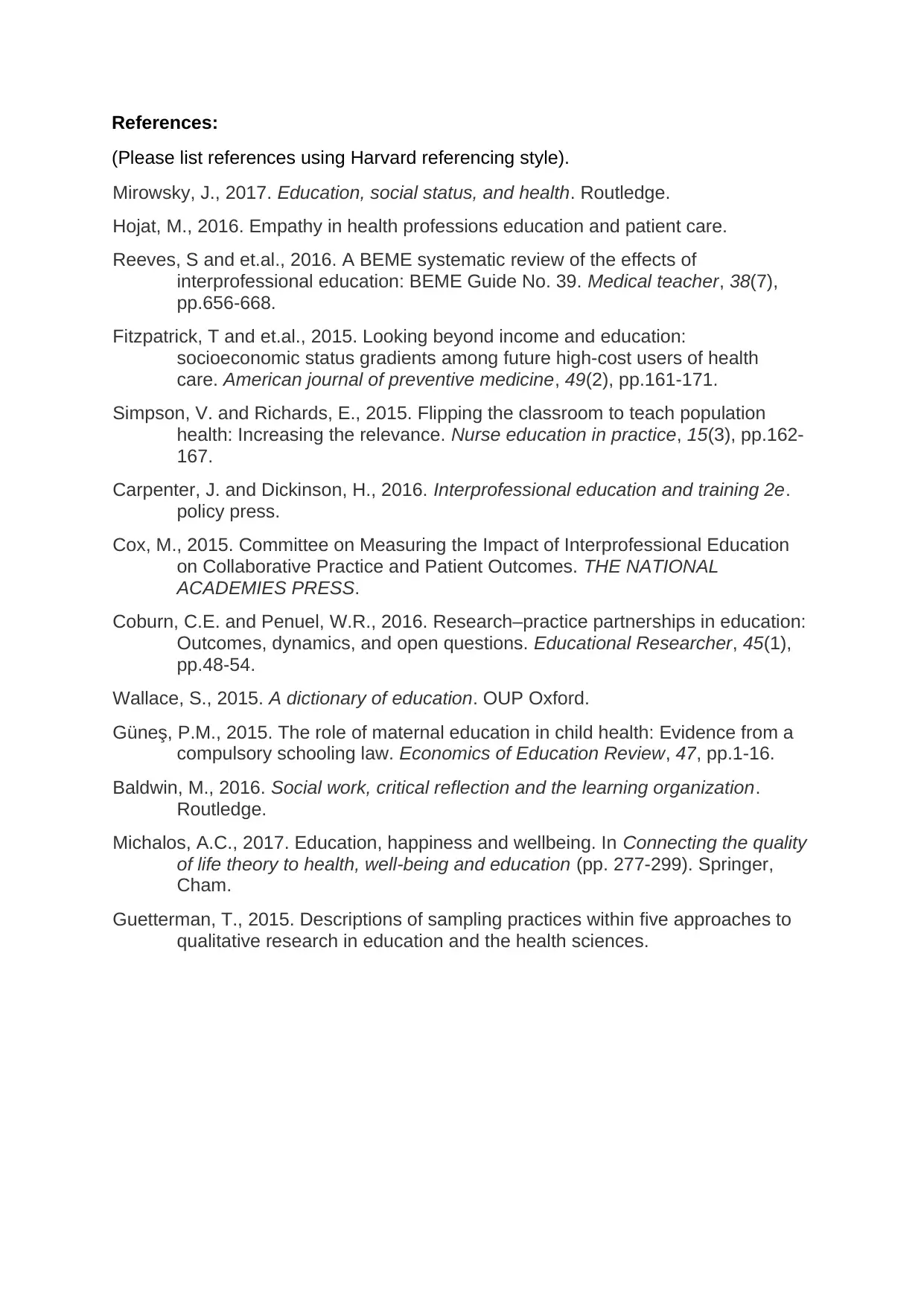
References:
(Please list references using Harvard referencing style).
Mirowsky, J., 2017. Education, social status, and health. Routledge.
Hojat, M., 2016. Empathy in health professions education and patient care.
Reeves, S and et.al., 2016. A BEME systematic review of the effects of
interprofessional education: BEME Guide No. 39. Medical teacher, 38(7),
pp.656-668.
Fitzpatrick, T and et.al., 2015. Looking beyond income and education:
socioeconomic status gradients among future high-cost users of health
care. American journal of preventive medicine, 49(2), pp.161-171.
Simpson, V. and Richards, E., 2015. Flipping the classroom to teach population
health: Increasing the relevance. Nurse education in practice, 15(3), pp.162-
167.
Carpenter, J. and Dickinson, H., 2016. Interprofessional education and training 2e.
policy press.
Cox, M., 2015. Committee on Measuring the Impact of Interprofessional Education
on Collaborative Practice and Patient Outcomes. THE NATIONAL
ACADEMIES PRESS.
Coburn, C.E. and Penuel, W.R., 2016. Research–practice partnerships in education:
Outcomes, dynamics, and open questions. Educational Researcher, 45(1),
pp.48-54.
Wallace, S., 2015. A dictionary of education. OUP Oxford.
Güneş, P.M., 2015. The role of maternal education in child health: Evidence from a
compulsory schooling law. Economics of Education Review, 47, pp.1-16.
Baldwin, M., 2016. Social work, critical reflection and the learning organization.
Routledge.
Michalos, A.C., 2017. Education, happiness and wellbeing. In Connecting the quality
of life theory to health, well-being and education (pp. 277-299). Springer,
Cham.
Guetterman, T., 2015. Descriptions of sampling practices within five approaches to
qualitative research in education and the health sciences.
(Please list references using Harvard referencing style).
Mirowsky, J., 2017. Education, social status, and health. Routledge.
Hojat, M., 2016. Empathy in health professions education and patient care.
Reeves, S and et.al., 2016. A BEME systematic review of the effects of
interprofessional education: BEME Guide No. 39. Medical teacher, 38(7),
pp.656-668.
Fitzpatrick, T and et.al., 2015. Looking beyond income and education:
socioeconomic status gradients among future high-cost users of health
care. American journal of preventive medicine, 49(2), pp.161-171.
Simpson, V. and Richards, E., 2015. Flipping the classroom to teach population
health: Increasing the relevance. Nurse education in practice, 15(3), pp.162-
167.
Carpenter, J. and Dickinson, H., 2016. Interprofessional education and training 2e.
policy press.
Cox, M., 2015. Committee on Measuring the Impact of Interprofessional Education
on Collaborative Practice and Patient Outcomes. THE NATIONAL
ACADEMIES PRESS.
Coburn, C.E. and Penuel, W.R., 2016. Research–practice partnerships in education:
Outcomes, dynamics, and open questions. Educational Researcher, 45(1),
pp.48-54.
Wallace, S., 2015. A dictionary of education. OUP Oxford.
Güneş, P.M., 2015. The role of maternal education in child health: Evidence from a
compulsory schooling law. Economics of Education Review, 47, pp.1-16.
Baldwin, M., 2016. Social work, critical reflection and the learning organization.
Routledge.
Michalos, A.C., 2017. Education, happiness and wellbeing. In Connecting the quality
of life theory to health, well-being and education (pp. 277-299). Springer,
Cham.
Guetterman, T., 2015. Descriptions of sampling practices within five approaches to
qualitative research in education and the health sciences.
⊘ This is a preview!⊘
Do you want full access?
Subscribe today to unlock all pages.

Trusted by 1+ million students worldwide

Appendices (optional)
1 out of 10
Related Documents
Your All-in-One AI-Powered Toolkit for Academic Success.
+13062052269
info@desklib.com
Available 24*7 on WhatsApp / Email
![[object Object]](/_next/static/media/star-bottom.7253800d.svg)
Unlock your academic potential
Copyright © 2020–2026 A2Z Services. All Rights Reserved. Developed and managed by ZUCOL.




